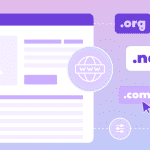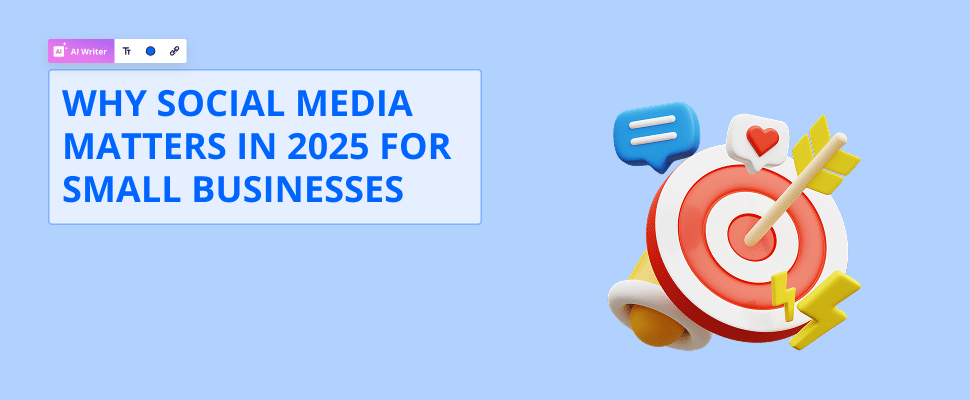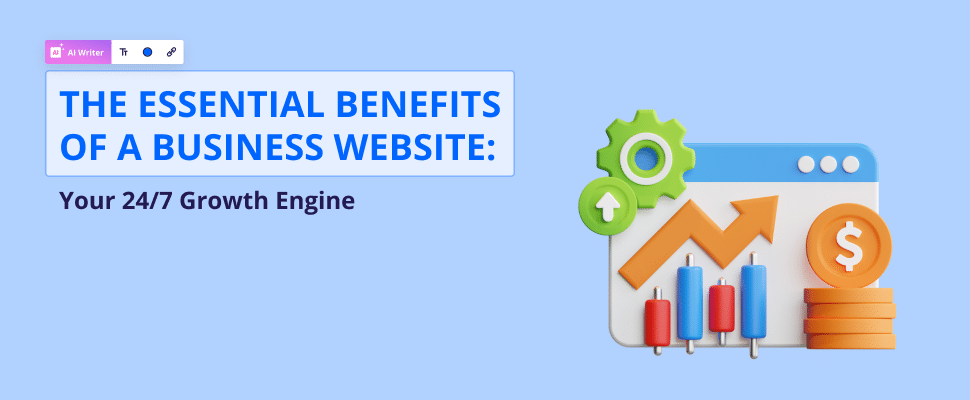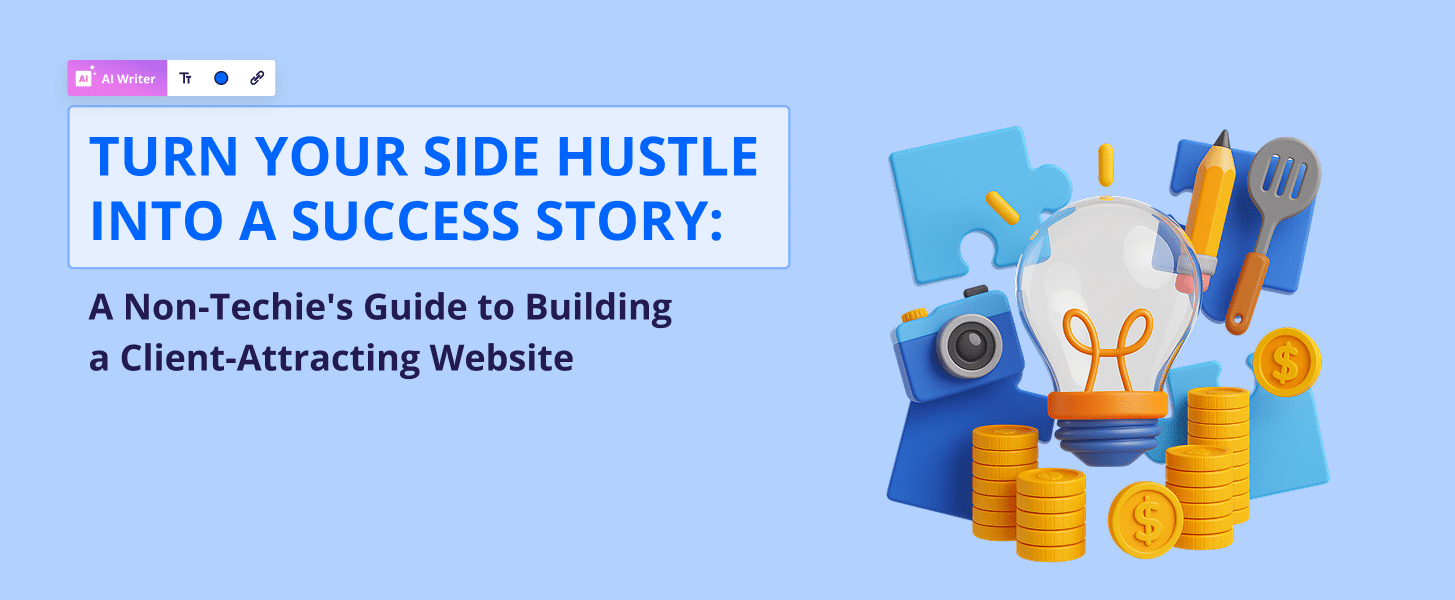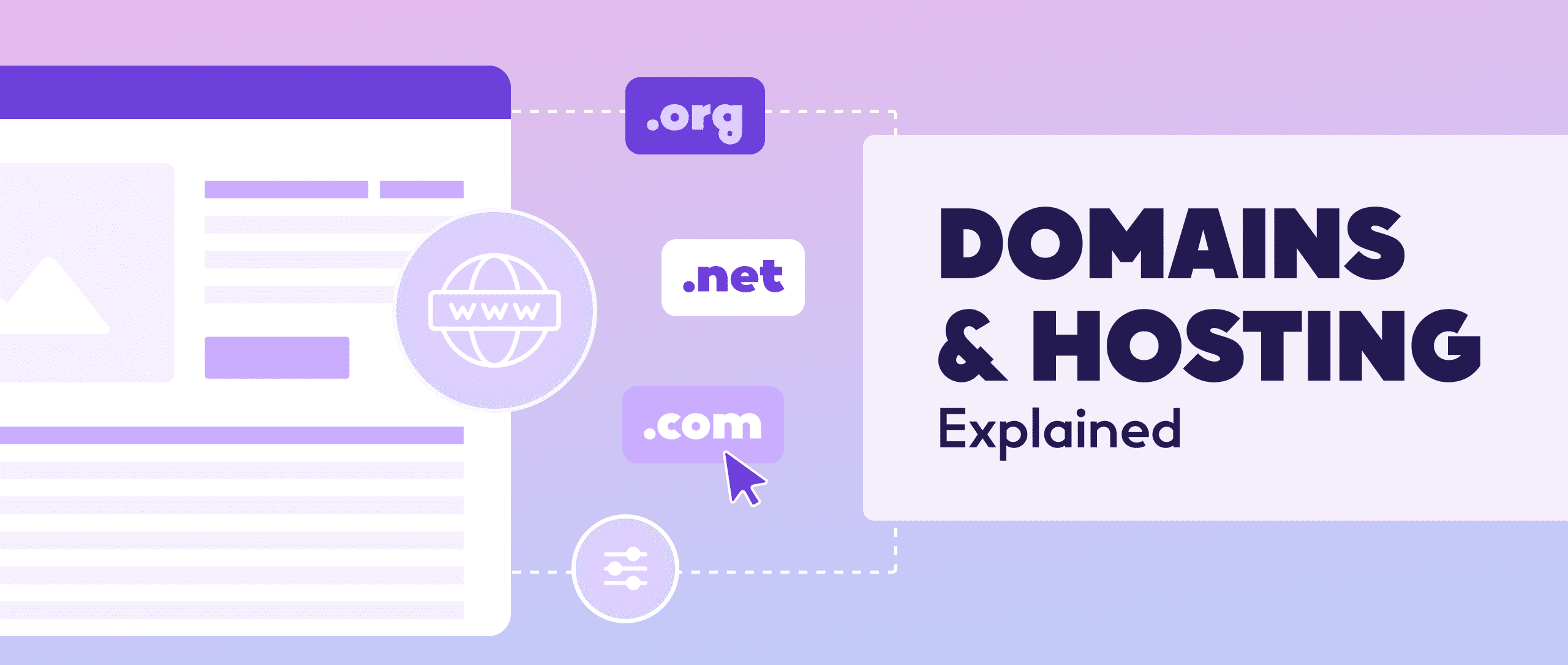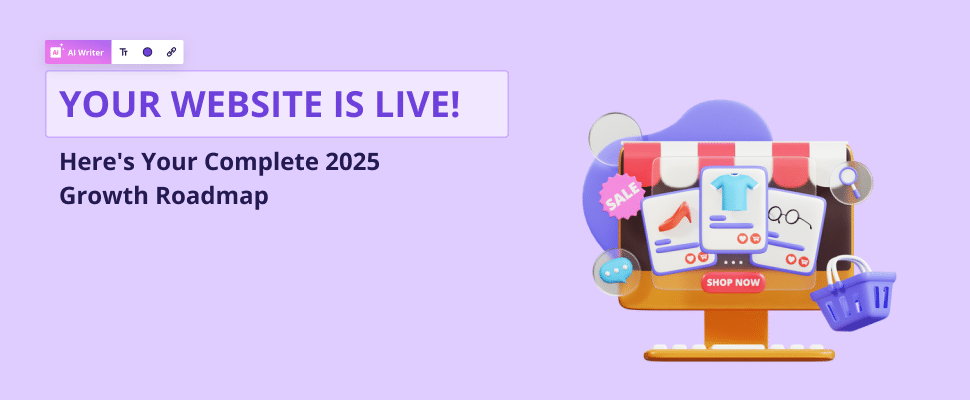
Your Website is Live! Here’s Your Complete 2025 Growth Roadmap
42 min to read
- Your website's success in 2025 depends on a multi-layered strategy that uses AI, mobile optimization, and data analysis to drive growth beyond just having an online presence
- Create content that goes beyond text by using AI to develop interactive quizzes, videos, and other formats that engage visitors and convert them into customers
- Follow a 90-day plan to build your site's foundation, generate traffic with SEO and social media, and use analytics and testing to continuously improve your conversion rates
The Harsh Reality: Why Most Websites Fail
Congratulations! You’ve just launched your beautiful new website with Hocoos, and you’re probably feeling pretty good about it right now. But here’s something that might sting a little: about 75% of all websites out there are basically digital ghosts, generating almost no meaningful traffic or actual conversions.
Why so? It’s not because they look bad or because the owners didn’t try hard enough, the problem runs deeper than that. Back in 2023, maybe you could get away with some basic stuff, but in 2025, simply having a website is like having a business card – it’s expected, but it won’t make your phone ring.
Table of Contents
The New Digital Reality
The internet has become an incredibly crowded place. Google now processes over 8.5 billion searches every single day (that’s up from 5.6 billion in 2023), and most of those searches, about 63%, happen on mobile devices. Meanwhile, voice search is exploding, growing by 35% each year, while AI-generated content floods every corner of the web. On top of that, social media platforms tweak their algorithms practically every month, so what got you seen yesterday might not help tomorrow.
Why Your Website Needs More Than Just SEO
That old “build it and they’ll show up” approach is pretty much ancient history. To actually thrive, your site has to lean into smarter, adaptive, and multi-layered methods. It must be optimized first and foremost for mobile users, ready for voice search queries, integrated with social media, finely tuned for conversions, and driven by solid data analysis. And most importantly, it has to leverage AI-powered content strategies that really understand your audience’s needs.
Your 90-Day Growth Roadmap
This is your complete blueprint for turning your website from a digital brochure into something that actually brings in customers. Let’s dig into 12 essential strategies that separate the websites that work in 2025 from the ones that don’t.
1. The Foundation: SEO in the AI Era
Keyword Research 2025: Beyond the Basics
Remember when keyword research meant typing words into a tool and hoping for the best? Those days are over. AI-powered keyword discovery is changing everything. Modern tools can predict which keywords are about to explode before they actually do, analyze what people really mean when they search for something, automatically find long-tail opportunities you’d never think of, and track your competitor keyword movements in real-time.
Recommended Tools that give you insights into human behavior:
- Ahrefs AI Keyword Generator: Uses AI to suggest related keywords
- SEMrush AI Content Assistant: Analyzes content gaps and opportunities
- Google Trends with AI Insights: Predicts keyword trajectory
- AnswerThePublic: Identifies voice search and question-based keywords
Voice search is particularly interesting because people talk differently than they type. When someone types, they might search for “pizza delivery” (think of long-tail, conversational keywords). When they talk, they say “where can I get pizza delivered right now that’s still open?”. Your content needs to answer both versions.
With 50% of searches expected to be voice-based by 2025, it’s vital to consider local search optimization as well, to deliver answers to area-based queries like “restaurants open late downtown.”
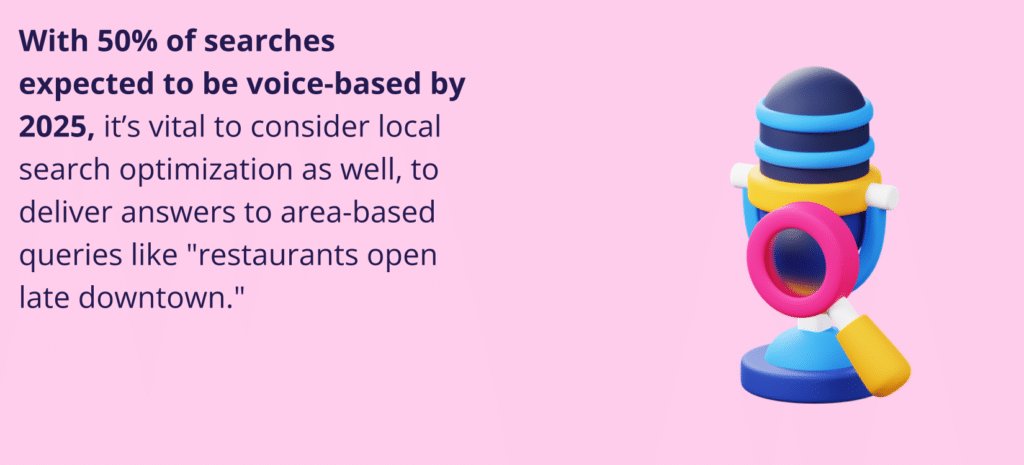
Technical SEO: The Foundation of Success
On the technical side, Google has raised its standards. Your site speed needs to be razor fast: Google wants your largest piece of content to load in under 2.5 seconds (LCP or Largest Contentful Paint) and your pages to respond to user taps in under 100 milliseconds (FID or First Input Delay). It’s also important to keep your CLS (Cumulative Layout Shift) under 0.1 to basically stop making content jump around and confuse users.
Mobile-first indexing means Google looks at your mobile site first, then your desktop site. Thus, responsive, mobile-first design is no longer a bonus, it’s a must-have. Your mobile pages need to load in under 3 seconds, everything needs to be easy to tap with a thumb, and your content needs to work on small screens. Don’t forget to implement structured data – this helps Google understand your content and can boost local SEO, e-commerce visibility, and even get your FAQs featured in search results.
2. Content Strategy That Converts
AI-Powered Content Creation
Creating content that actually pulls people in and gets them to act means tapping into AI for smarter planning and execution. Use ChatGPT to spit out dozens of topic ideas in no time, Jasper to sketch out full outlines, Surfer SEO to tweak everything for search engines, and Grammarly to polish it up and catch any slip-ups. It’s all about speeding things up without sacrificing quality.
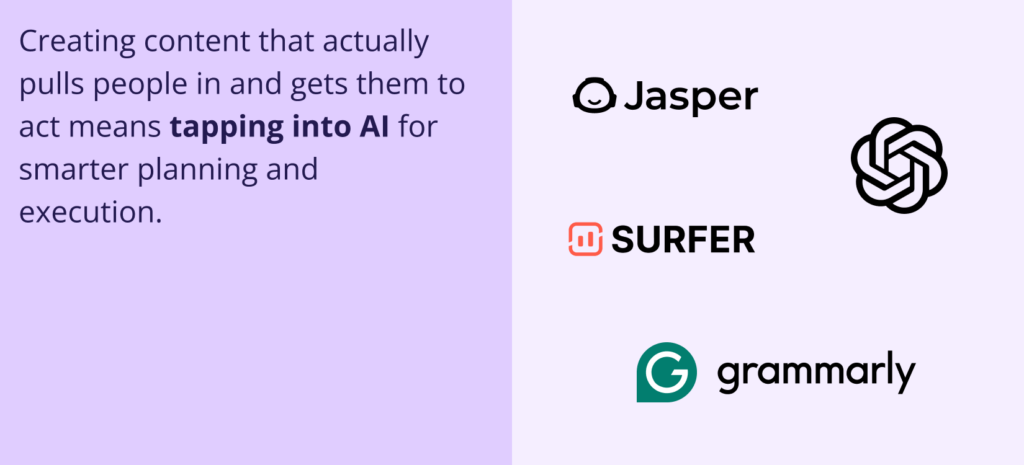
Automated Content Optimization
Let AI score your drafts before they go live, balance out keyword usage so it doesn’t feel forced, check if it’s easy to read, and give it an overall SEO thumbs-up. This way, you’re not guessing – you’re optimizing smartly from the start.
Content Types That Drive Engagement
Video Content Dominance
To really engage folks, mix in different formats that keep them hooked. Video is huge – short clips on TikTok, Reels, or YouTube Shorts grab quick attention, while live streams on Facebook or Instagram build real connections. Make videos interactive with polls or clickable bits, and show behind-the-scenes stuff to feel more genuine. Then there’s interactive content like quizzes that collect leads, calculators that solve problems and snag emails, dynamic infographics that hold attention longer, or even encouraging users to share their own stories to foster a community.
And don’t forget to repurpose! One great piece of content can become a video, a LinkedIn post, an Instagram story, and a lead magnet.
Interactive Content
It’s no longer about churning out blog posts just to keep your site active. Your content has a job: to attract, engage, and convert. Things like quizzes or assessments not only engage people but also snag their emails for leads. Calculators and handy tools offer real help while building your list, interactive infographics keep folks on your page longer, and encouraging user-generated content fosters a sense of community and trust.
Content Calendar Automation
Tools like Buffer, Hootsuite, or Later can handle scheduling with AI smarts, so you’re posting consistently. Repurpose your best stuff into different formats to stretch it further, plan around seasons or events that fit your business, and use performance data to focus on what actually clicks with your audience.
3. Social Media Mastery 2025
Platform-Specific Strategies
TikTok: The New King of Social Media
TikTok has emerged as the new king of social media discovery, but its algorithm rewards engagement over follower count, which levels the playing field for smaller businesses. Success on TikTok requires staying current with trending sounds and hashtags, leveraging duets and collaborations to tap into other creators’ audiences, and showing your business personality through behind-the-scenes content that feels authentic rather than polished.
Instagram: Beyond the Grid
Instagram has evolved far beyond just posting pretty pictures. Reels need that 9:16 aspect ratio and trending audio to perform well. Stories require daily engagement with interactive elements. Carousel posts are great for educational content and tutorials. Shopping integration lets people discover and buy products directly from your posts.
LinkedIn: B2B Networking Powerhouse
LinkedIn remains the powerhouse for B2B networking. Professional content that shares industry insights and thought leadership performs well. Your company page needs to be complete with regular updates. Employee advocacy, where your team shares company content, expands your reach significantly. LinkedIn Ads let you target specific industries and job titles with precision.
YouTube: SEO and Community Building
YouTube combines SEO with community building. Optimizing for keywords in titles, descriptions, and tags helps with discovery. The Community tab builds relationships with subscribers between video uploads. Creating playlists increases watch time and engagement. Collaboration opportunities with complementary channels can introduce you to new audiences.
Algorithm Understanding and Optimization
Current algorithms prioritize engagement rate over vanity metrics – comments, shares, and saves matter more than likes. Time spent with your content is crucial; longer engagement equals better reach. Authenticity wins over reposted material. Community building through active engagement with followers creates lasting relationships.
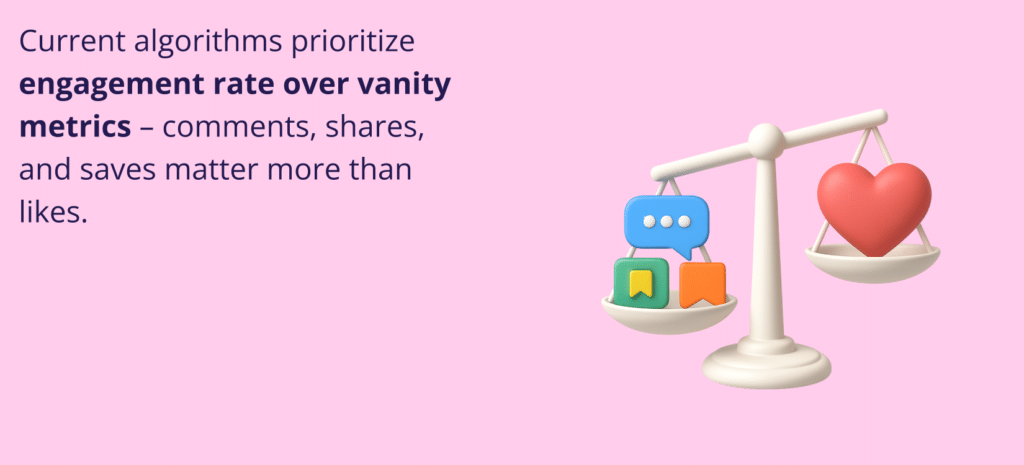
Content scheduling isn’t just about consistency; it’s about optimization. Use analytics to find when your audience is actually online. Consistency beats frequency – regular posting builds trust better than sporadic bursts. Cross-platform promotion shares content across all channels efficiently. Engagement monitoring means responding to comments within an hour when possible.
4. Google My Business & Local SEO
Local Search Domination
Google My Business optimization starts with completing every single section of your profile thoroughly. Start by filling your profile with high-quality, professional images of your business as it really makes a huge difference. Regular updates with posts, offers, and announcements also keep your profile fresh. Finally, choosing the most specific categories possible helps Google understand exactly what you do.
Local keyword strategies focus on how people actually search. “Near me” searches are incredibly common, so optimizing for location-based queries is essential. The real cherry on top is mastering target keywords: use phrases that include “near me” or specifics like “website design services downtown” or “best restaurants in your city,” and longer ones tailored to locals, such as “affordable website builder for small business in [city].”
Tools like Podium or Birdeye can automate review management, such as asking for reviews, monitor what people are saying across sites, handle quick thanks for good feedback, and deal with complaints in a calm, helpful way to turn things around.
Voice Search Optimization
For voice searches, use local schema to clue in engines about your whereabouts, ensure your site’s speedy on mobile, create content tied to local happenings, and team up with nearby businesses for shout-outs that boost visibility.
5. Paid Advertising Strategies
Google Ads 2025
Performance Max campaigns use AI-powered optimization across all of Google’s channels – Search, Display, YouTube, Gmail, and Discover. The platform automatically optimizes for your goals using machine learning. Smart bidding takes the guesswork out of bid management. Audience targeting uses first-party data and lookalike audiences for precision.
Smart Bidding Strategies
Options like Target CPA let you set what you’re willing to pay per conversion, Target ROAS focuses on getting the most bang for your buck, Maximize Conversions pumps up the volume of leads or sales, and Enhanced CPC for manual bids with smart optimization layered on top.
Conversion Tracking Setup
Hook up Google Analytics 4 to watch every click and scroll, use Tag Manager for all your codes, track even offline sales with enhanced conversions, and follow users across devices to see the full path they take.
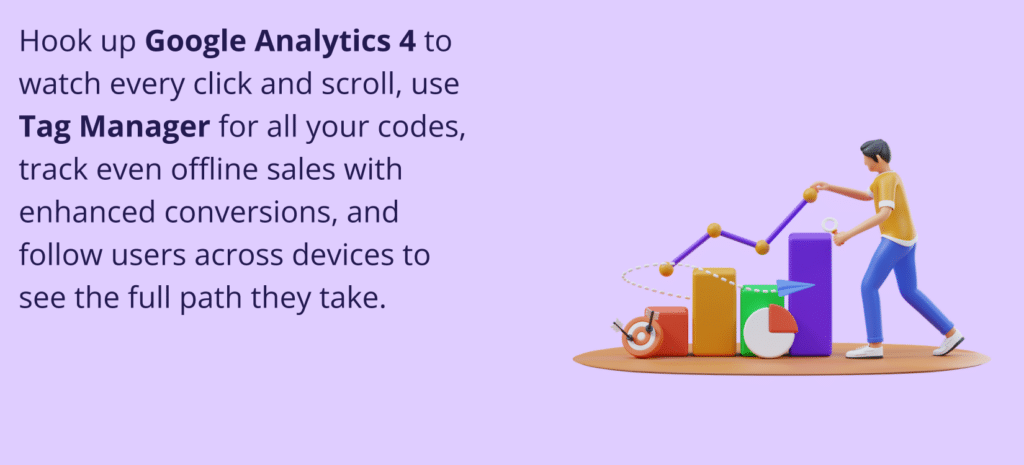
Social Media Advertising
Meta Ads optimization focuses on audience targeting with lookalike audiences and custom audiences. Creative optimization requires A/B testing images, videos, and copy continuously. Retargeting campaigns re-engage website visitors who didn’t convert initially. Dynamic ads automatically show relevant products to interested users.
TikTok Ads strategies include Spark Ads for boosting organic content performance, In-feed ads for native advertising experiences, TopView ads for full-screen video impact, and Branded hashtag challenges for viral marketing campaigns.
LinkedIn B2B campaigns excel at account-based marketing targeting specific companies, job title targeting to reach decision-makers, industry targeting to focus on relevant sectors, and company size targeting to distinguish between small business and enterprise needs.
6. Email Marketing & Automation
List Building Strategies
Lead Magnet Optimization
Create freebies that deliver quick wins, test variations to see what pulls in more sign-ups, highlight how popular they are with download counts, and add a bit of pressure with time-limited access.
Popup and Form Strategies
Use popups that trigger when someone’s about to bounce, forms that pop up after they’ve scrolled a bit, tweak designs and timing through tests, and make sure they’re easy to fill out on phones.
Social Media List Building
Dive into Facebook groups related to your niche, network on LinkedIn with pros, link from your Instagram bio to sign-up pages, and chat on Twitter to connect with influencers who might share your stuff.
Automation Workflows
Welcome Sequences
Start with a warm welcome packed with value, follow up with a success story for credibility, guide them on next steps, and tackle common questions. It sets a positive tone.
Abandoned Cart Recovery
Remind them with a product pic in the first email, add testimonials and a nudge in the second, offer a deal in the third, and close with a last-chance scarcity play.
Re-engagement Campaigns
Spot who’s gone quiet by checking activity, tempt them back with perks, suggest content tailored to them, or ask for feedback to learn what went wrong.
7. Conversion Optimization
User Experience (UX) Design
Run A/B tests based on smart guesses, wait for real stats, as it isn’t just randomly changing button colors and hoping for the best. You need hypothesis-driven testing where you test one element at a time. Wait for statistical significance before declaring a winner – jumping to conclusions based on a day’s worth of data is how you make bad decisions. Keep optimizing continuously because what works today might not work tomorrow. And base your changes on actual user behavior data, not what you think users want.
Heat Mapping and User Behavior
For mobile users, large, easy-to-click buttons and fast-loading pages make a huge difference. Heat mapping and user behavior analysis shows you what’s really happening on your site. Click tracking reveals where users are actually clicking (spoiler: it’s not always where you want them to). Scroll depth analysis shows you if anyone’s actually reading that brilliant content you wrote. Mouse movement tracking identifies where user attention goes. And form abandonment analysis helps you figure out why people bail before converting.
Mobile optimization goes way beyond making things smaller to fit on a phone. Touch-friendly design means buttons you can actually tap without zooming in. Fast loading isn’t optional – optimize those images and minimize that code. Simplified navigation acknowledges that nobody wants to dig through complex menus on their phone. And mobile-specific content means shorter paragraphs and more bullet points because nobody’s reading your novel on a 6-inch screen.
Conversion Elements
Call-to-action optimization is both an art and a science. Test button design including color, size, and placement – but don’t just make them bigger and assume that’s better. Copy testing should focus on action-oriented, benefit-focused language that tells people exactly what they’ll get. Create urgency with limited-time offers that actually expire. And add social proof through testimonials and case studies that feel real, not manufactured.
Form Design Best Practices
Form design can make or break your conversion rate. Ask for minimal information – every additional field reduces completion rates. Use progressive disclosure to show fields only as they become relevant. Provide clear, helpful error messages instead of cryptic red text. And give immediate success confirmation so people know their submission worked.
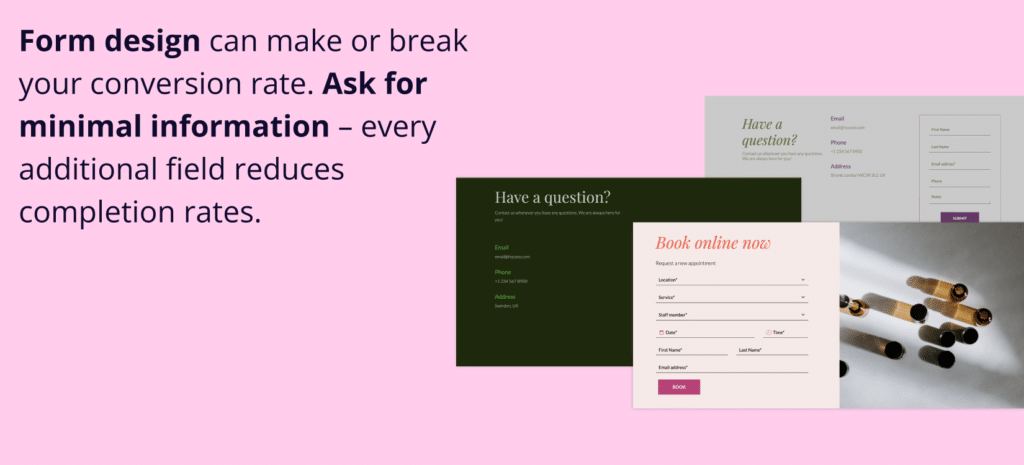
Trust Signals and Social Proof
Trust signals and social proof are the difference between a conversion and a bounce. Customer testimonials work best with real names and photos – “John D.” doesn’t cut it anymore. Case studies need detail and specifics to be believable. Social proof numbers like “Join 10,000+ satisfied customers” work if they’re real. And security badges for SSL certificates and payment processing ease anxiety about entering sensitive information.
8. Analytics & Performance Tracking
Essential Metrics
Traffic Sources and Quality
Break down where visitors come from: organic searches show your SEO game, direct hits mean people know your brand, referrals point to links and partners, and social breaks it out by platform.
User behavior analysis goes deeper than surface-level metrics. Time on page tells you if your content is actually engaging or if people are just confused. Bounce rate reveals whether your pages are relevant to what people expected. Pages per session shows if your site navigation and internal linking are working. And conversion funnels identify exactly where you’re losing potential customers.
Conversion tracking ties everything together. Goal completion tracks specific user actions that matter to your business. E-commerce tracking provides revenue and transaction data that shows real ROI. Lead generation metrics track form submissions and downloads. And ROI measurement calculates the actual return on your marketing investment, not just vanity metrics.
Tools and Setup
Google Analytics 4 Mastery is a completely different beast than Universal Analytics was. Event tracking lets you monitor custom user interactions that matter to your business. Audience insights help you understand who your visitors actually are, not who you think they are. Conversion attribution shows the entire multi-touch customer journey. And predictive analytics use AI to forecast future behavior based on past patterns.
Google Search Console
Google Search Console is your window into how Google sees your site. Search performance shows keyword rankings and impressions so you know what’s working. Indexing status ensures your pages are actually discoverable. Mobile usability identifies issues before they tank your rankings. And Core Web Vitals monitoring keeps you ahead of performance problems.
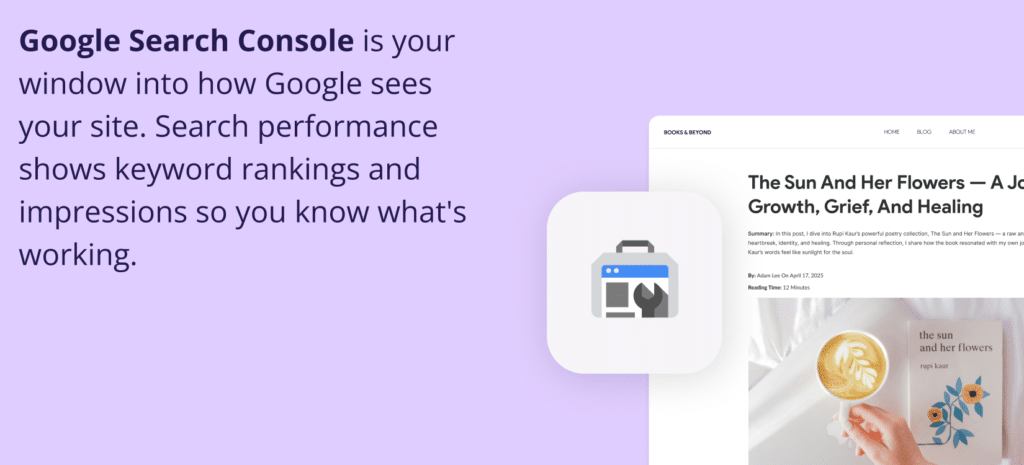
Heat Mapping Tools
Heat mapping tools provide visual insights you can’t get from numbers alone. Hotjar shows user behavior through heatmaps and recordings. Crazy Egg tracks clicks and scrolls with visual overlays. Lucky Orange provides session recordings that show exactly how users navigate your site. And FullStory captures the complete user journey from entry to exit or conversion.
9. Mobile-First Optimization
Most people will meet your website on their phone first. That means fast loading, thumb-friendly buttons, clean menus, and bite-sized content. Progressive Web Apps (PWAs) even let you deliver app-like experiences with push notifications and offline access without building a separate app.
Mobile Performance
Core Web Vitals Optimization
Speed up big images for faster paints, cut JavaScript to reduce delays, lock elements to avoid shifts, and test with PageSpeed Insights.
Make navigation effortless with big buttons, keep menus simple, load fast by optimizing everything, and write concise, skimmable content.
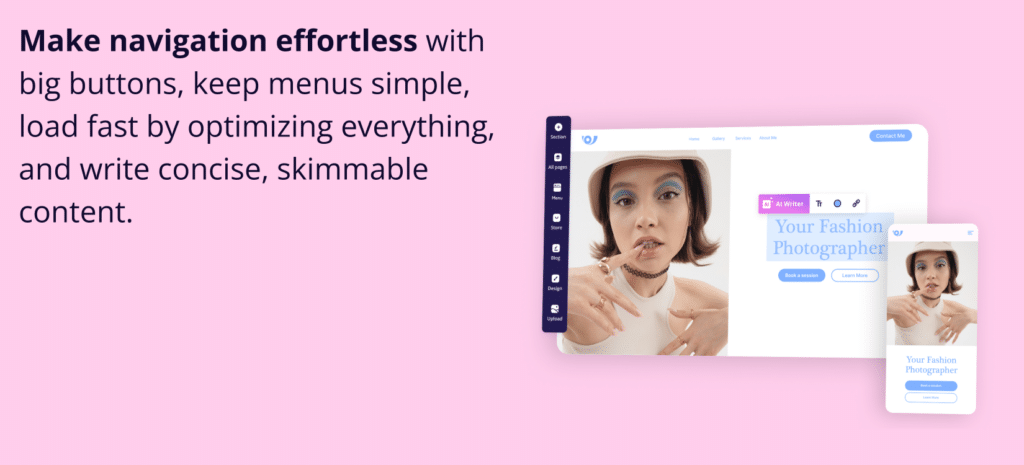
Progressive Web Apps (PWA)
These give an app vibe on mobile, work offline, send push alerts to bring people back, and let users add them to home screens for easy access.
SMS Marketing Strategies
Build lists with clear opt-ins, send deals or updates, confirm orders via text, and remind about appointments to cut no-shows.
Use geofences for area-specific pushes, beacons for close-up messages, boost “near me” visibility, and add easy payments like Apple or Google Pay.
10. AI and Automation Tools
New AI and automation tools are emerging faster than ever. Stay ahead of the curve by exploring the latest new SaaS platforms as soon as they launch using Tekpon discovery tool to find new solutions before others do.
Content Creation
You don’t need a team of 10 to act like one. Use AI Writing Assistants for specific purposes:
- ChatGPT: Content ideation and writing
- Jasper: Marketing copy and blog posts
- Copy.ai: Ad copy and social media content
- Writesonic: SEO-optimized content
Image Generation Tools
- DALL-E: AI-generated images from text
- Midjourney: High-quality artistic images
- Canva AI: Design templates and suggestions
- Remove.bg: Background removal and editing
Video Creation Platforms
- Synthesia: AI-generated video content
- Lumen5: Text-to-video conversion
- InVideo: Template-based video creation
- Kapwing: Online video editing
Marketing Automation
The same goes for automation in various areas. Consider the following:
Email Automation Platforms
- Mailchimp: Basic email marketing
- ConvertKit: Creator-focused automation
- ActiveCampaign: Advanced automation workflows
- Klaviyo: E-commerce email marketing
Social Media Automation
- Buffer: Content scheduling and publishing
- Hootsuite: Multi-platform management
- Later: Visual content planning
- Sprout Social: Social media management and analytics
Chatbot Implementation
- Chatfuel: Facebook Messenger bots
- ManyChat: Multi-platform chatbot builder
- Intercom: Customer support automation
- Drift: Lead generation and qualification
11. Growth Hacking Strategies
Viral Marketing
Shareable content creation requires understanding the psychological triggers that motivate people to share content with their networks. Emotional triggers like joy, surprise, anger, or fear create strong motivations for sharing. Practical value through how-to guides and actionable tips provides utility that people want to pass along. Social currency makes people look good or knowledgeable when they share your content. Compelling storytelling with narratives that resonate emotionally drives organic sharing.
Referral programs can exponentially expand your customer base through word-of-mouth marketing. Effective incentive structures reward both the referrer and the new customer, creating win-win scenarios. Easy sharing mechanisms with one-click social media integration remove friction from the referral process. Robust tracking systems monitor referral sources and conversion rates for optimization. Gamification elements like leaderboards and achievements make participation more engaging and competitive.
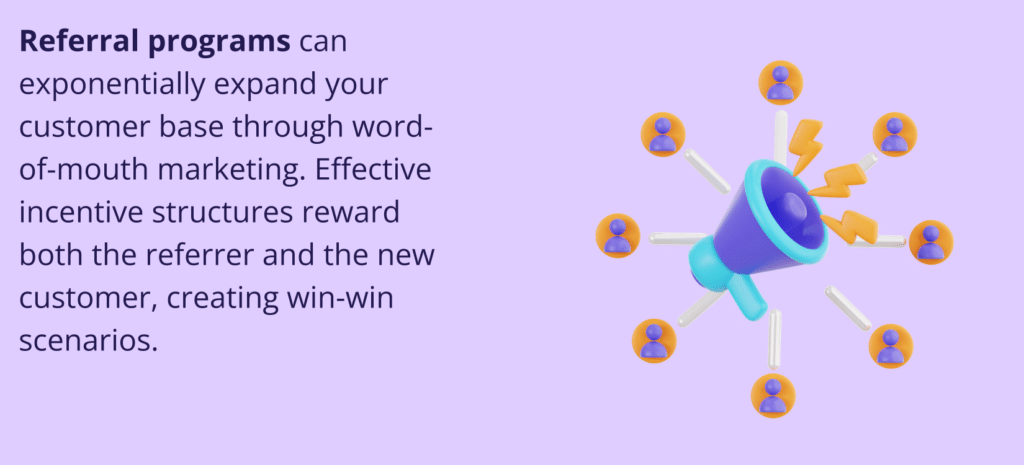
Influencer partnerships have evolved beyond simple product placements to authentic collaborations. Micro-influencers with smaller but highly engaged audiences often provide better ROI than mega-influencers. Authentic partnerships with genuine product endorsements create more believable marketing messages. Content collaboration results in co-created content that benefits both parties. Performance tracking enables ROI measurement and optimization of influencer relationships.
Scaling Strategies
Traffic multiplication techniques maximize the return on content creation investments. Content repurposing transforms one piece of content into multiple formats for different platforms and audiences. Cross-platform promotion shares content across all available channels for maximum exposure. Partnership marketing through collaborations with complementary businesses expands reach organically. Guest posting on industry publications provides exposure to established audiences while building backlinks.
Conversion rate optimization increases revenue without increasing traffic costs through systematic improvement. A/B testing enables continuous improvement through data-driven experimentation. User experience optimization reduces friction and improves conversion flows. Social proof enhancement through additional testimonials and case studies builds credibility. Urgency and scarcity tactics through limited-time offers and availability create motivation for immediate action.
Customer lifetime value optimization maximizes revenue from existing customers rather than constantly acquiring new ones. Upselling strategies offer premium products and services to existing customers. Cross-selling recommends complementary items that enhance the initial purchase. Loyalty programs reward repeat customers and encourage continued engagement. Subscription models create recurring revenue streams that improve business predictability and cash flow.
12. Your 90-Day Implementation Plan
Month 1: Foundation Building
Week 1-2: Technical Setup
Get Google Analytics 4 running, hook up Search Console, tweak those Core Web Vitals, and layer in structured data to solidify your base.
Week 3-4: Content Foundation
Map out a calendar, integrate AI tools, refresh old posts, and brainstorm your first batch of blogs to build momentum.
Month 2: Traffic Generation
Week 5-6: SEO Implementation
Hunt keywords, polish metas, link internally, and submit your sitemap to get the traffic flowing.
Week 7-8: Social Media Launch
Spruce up profiles, craft your first 20 posts, chat with your target audience, and start nurturing a community.
Month 3: Conversion Optimization
Week 9-10: Analytics and Testing
Track conversions, run A/Bs, study behaviors, and optimize conversion funnels for better results.
Week 11-12: Scaling and Automation
Automate emails, set up broader tools, dip into paid ads, and roll out referrals to grow.
Conclusion: Success Requires Action
Websites don’t fail because of design problems alone – they stumble when there’s no strategy to bring in and keep visitors. Slow load times, weak content, no calls to action, and no clear data insights leave websites as digital dead ends.
But with deliberate steps, businesses see three times more traffic and double the conversion rates of their competition. These strategies not only grow your audience but build meaningful relationships and position your brand for fast, scalable growth using smart AI and automation.
Start Your Growth Journey Today
Your site’s the starting line; now’s when the hustle kicks in. Pick one thing here and tackle it this week, then layer on more. Soon enough, it’ll be cranking out real results.
Ready to make it a powerhouse? Jump in with Hocoos’ AI gear and chip away at these steps.
Remember: The best time to start was yesterday. The second-best time is now. Your website’s success depends on the actions you take today.
“The future belongs to those who believe in the beauty of their dreams.” – Eleanor Roosevelt
Your website’s future success starts with implementing these growth strategies. What are you waiting for?
Frequently Asked Questions (FAQs)
What is the most important first step after launching a new website?
The most critical first step is setting up your analytics and tracking tools, such as Google Analytics 4 and Google Search Console. This foundation allows you to monitor your site’s performance, understand user behavior, and make data-driven decisions from day one. Without these tools, you are essentially flying blind.
How can I leverage AI in my content strategy?
AI tools can significantly boost your efficiency. You can use them to generate content ideas, draft outlines, optimize text for SEO, and even automate your content calendar. This allows you to produce high-quality, relevant content at a much faster pace, ensuring you stay competitive.
Is social media still a powerful tool for website growth?
Yes, but the strategy has evolved. Social media is now less about follower count and more about platform-specific, engagement-driven content. Focusing on building an authentic community through consistent, high-value posts that leverage trending formats like TikToks and Instagram Reels is key to driving traffic and conversions.
How can I turn my website visitors into customers?
Focus on conversion rate optimization (CRO) by improving your site’s user experience and implementing trust signals. Use heat mapping to see what users are doing, optimize your forms to be as simple as possible, and add testimonials, case studies, and security badges to build credibility and encourage action.
What is the biggest mistake new website owners make?
The biggest mistake is the “build it and they will show up” mindset. In 2025, simply having a website is not enough. Without a proactive strategy for content creation, search engine optimization, and social media engagement, most websites will fail to attract the audience they need to succeed.
FOLLOW us


